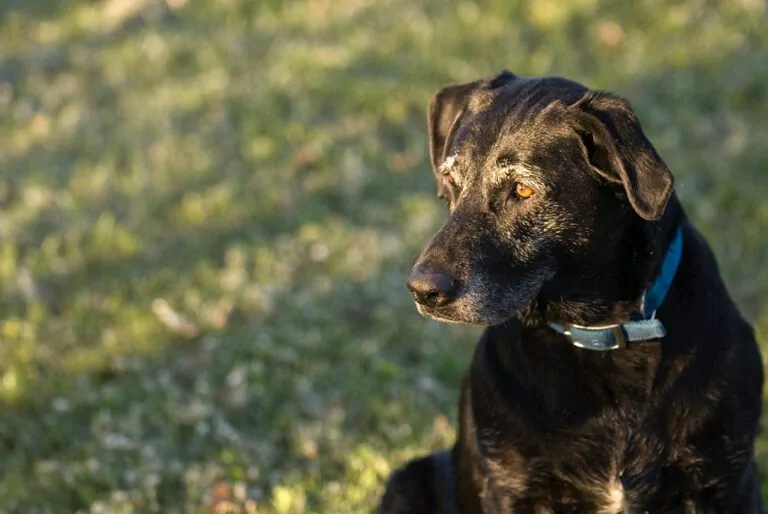Dementia in dogs, also known as Canine Cognitive Dysfunction (CCD), is a disorder that causes symptoms similar to Alzheimer’s in humans.
It is most commonly related to the aging process, which affects the chemical and physical components of a dog’s brain. These alterations lead to changes in their behavior, memory, and ability to learn and comprehend things. But CCD can also occur in dogs with certain genetic disorders, brain tumors, and brain trauma.
Read on to learn the symptoms, diagnosis, and forms of treatment available of dog dementia by reading our Crown Point, IN, animal hospital’s article below.
Symptoms of Dog Dementia
You should consult your veterinarian if you notice your dog demonstrating one or more of the following*:
- Disorientation and confusion (appearing to be lost or confused among people and surroundings in which they should otherwise be familiar)
- Anxiety
- Failing to remember routines and previous training
- No longer responding to their name or previously learned commands
- Extreme irritability
- Decreased desire to play
- Aimless wandering
- Staring blankly
- Slow to learn new commands or tasks
- Disinterest in self-grooming
- Loss of appetite
- Changes in sleeping patterns
*These signs do not necessarily indicate CCD, but they could be indications that your dog is suffering from another illness. So, either way, it’s probably good to bring your dog in for a consultation if they are demonstrating any of them—or any other behavior that you find suspicious.
Dog Dementia Diagnosis
CCD requires a diagnosis from a veterinarian, and the methods to do so may include diagnostic tests on their blood and thyroid, ultrasounds, and x-rays. Your vet may also recommend more advanced imaging like an MRI or CT scan.
Treatment of Dog Dementia
There is no known cure for CCD, but dog owners may be able to slow the progress of it by maintaining a dog’s healthy diet and stimulating environment, which includes daily routine exercise (especially at bedtime), play, and mental stimulation.
Making sure that your home is as safe and accessible for a senior dog is also helpful. This may include night lights to help them navigate in the dark, potty pads near doors for them to use if they can’t hold it long enough for you to come home or wake up, and orthopedic foam beds (with washable covers) to help them sleep comfortably.
Your vet may also prescribe medication and behavioral therapy to help as well. These medications may include anxiety meds and Anipryl (selegiline). The latter of which blocks monoamine oxidase B (MOAB), an enzyme that breaks down certain chemicals in the brain, which allows neurotransmitters to remain in the brain where they are needed.
Furthermore, a change of diet may also be recommended by your veterinarian. These diets are usually aimed at improving a dog’s cognitive function. Such diets are typically rich with antioxidants, vitamin B, E, and C, selenium, flavonoids, and beta carotene, all of which are considered beneficial for a dog’s cognitive health.
Other potentially helpful supplements include omega fatty acid, melatonin, and s-adenosylmethionine (sam-e).
The right treatment plan for your dog, given their health history, symptoms, etc., will be determined by your veterinarian.
Then, once a plan is set, your vet will want to schedule regular check-ups to monitor your dog’s response and the progression of their symptoms. However, the owner of a dog diagnosed with CCD should contact their veterinarian immediately if they notice any behavioral changes.
Dog Aging Project
In a study published in 2022 in the Science Reports journal, researchers asked over 15,000 dog owners to complete surveys between 2019 and 2020 on their dogs’ health and cognitive status. Then, scientists grouped the dogs together based on age and analyzed the results.
Their findings concluded that after a dog turns 10, their odds of developing CCD increases by 68%. However, when considering the breed, existing health problems, sterilization, and physical activity, the risk fell to 52%.
In addition, it was found that dogs with a history of neurological, eye, or ear disorders are at a higher risk of developing CCD.
In good news, the study also found that almost no cognitive decline occurs in dogs under 10 years old.
Prevention of Dog Demtentia
Although not 100% effective, there are several things you can do to help keep your dog’s mind sharp and strong. They include:
- Teaching new tricks
- Playing games
- Feeding them a balanced, whole food diet
- Considering supplements that promote brain health
- Getting plenty of exercise
- Allowing for new experiences and regular socialization
- Eliminating exposure to toxins
Early intervention is key in combating the symptoms and progression associated with the disease. Make sure that you keep up with regular vet visits, and the moment you notice your dog demonstrating any sign of cognitive abnormality, get them to a vet as soon as possible to ensure that they have the best chance at living a happy, long, and fulfilled life!
Reach Out to Our Crown Point, IN, Vets If Your Dog Is Displaying Dementia Symptoms
Unfortunately for some dogs, the aging process can come with CCD. But with early intervention, proper treatment, and plenty of love and care, they can go on to live just as long as a dog without the disorder.
Reach out to our Crown Point, IN, animal hospital if you believe your dog may be displaying symptoms of dementia by giving us a call at (219) 267-1700.




